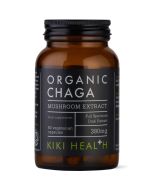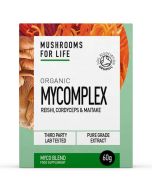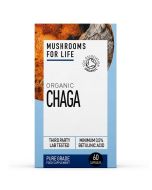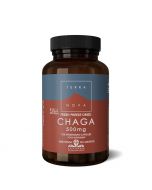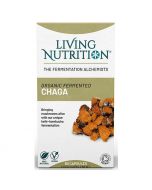
Chaga Mushroom: Benefits, Dosage, Side Effects
Nutritional Value | Health Benefits | Dosage | Side Effects
Chaga mushroom is rich in antioxidants and contains several phytonutrients, such as polysaccharides, beta-glucans, and triterpenes, which are believed to boost the immune system, fight inflammation, and potentially fight cancer cells.
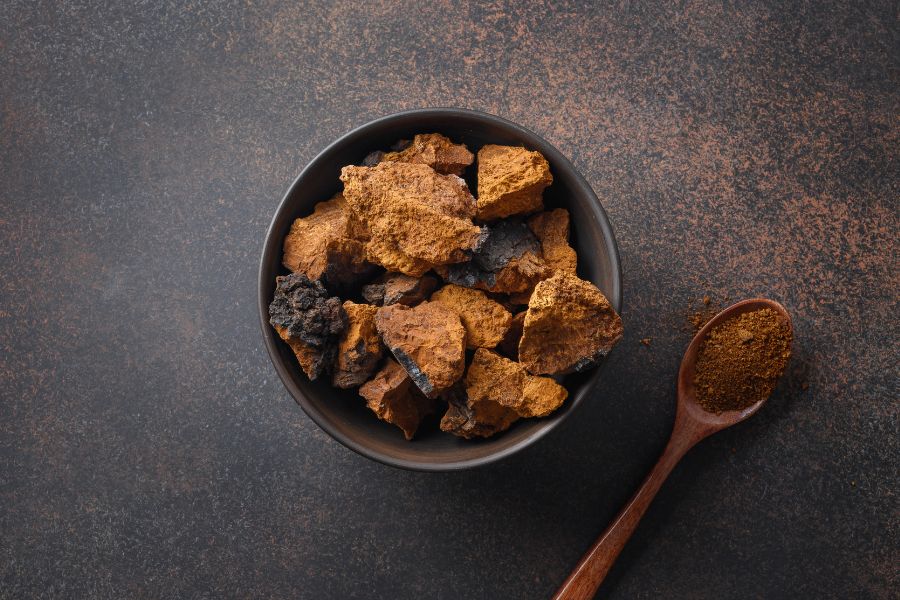
What are Chaga Mushrooms?
Chaga mushroom, also known as Inonotus obliquus, is a type of non-toxic fungus that predominantly grows on the bark of birch trees in cold climates found in Northern Europe, Russia, Korea, Northern Canada, and Alaska. It has been used for its medicinal properties in traditional medicine across Northern Europe and Russia for centuries.
Unlike typical mushrooms, Chaga does not have a cap and stem but instead appears as a dark, clumpy mass of mycelium that resembles burnt charcoal due to the high melanin content.
Chaga mushrooms fall under the category of ‘functional mushrooms’ which are types of mushrooms that are valued for their potential nutritional benefits and medicinal properties, often to support your health.
Chaga mushrooms are available as supplements and can be ground into a powder and made into a tea or extract. This process helps release its bioactive compounds, which are not easily digested when consumed directly.
Nutritional Value
Chaga contains a range of beneficial bioactive compounds, as well as antioxidants that have been found to support our health in various ways including:
- Polysaccharides: Such as beta-glucans, store energy and support cellular structure.
- Triterpenes: Primarily inotodiol, are known for anti-inflammatory, antimicrobial, antiviral, and potential anti-cancer properties.
- Melanins: Abundant in Chaga, offer anti-inflammatory and antioxidant benefits, protecting cells from free radical damage.
- Polyphenols: Including flavonoids, are known for their antioxidant effects that fight oxidative stress related to ageing and diseases.
- Triterpenoids: Such as betulin and betulinic acid from birch trees, have been researched for their anti-inflammatory, antiviral, and possible cancer-fighting support.
- Superoxide Dismutase (SOD): Converts harmful superoxide radicals into less damaging substances to the body.
Health Benefits of Chaga Mushrooms
Numerous studies on chaga mushrooms have shown that they may offer a variety of health benefits. While scientific research continues to explore these effects, here are some of the key advantages identified so far:
Lowers Cholesterol:
Research indicates that chaga mushrooms may lower cholesterol primarily through enhancing the activity of lecithin-cholesterol acyltransferase (LCAT). LCAT promotes the synthesis of high-density lipoprotein (HDL) which is our “good” cholesterol that absorbs the “bad” cholesterol, also known as low-density lipoprotein (LDL) from our blood and transports it to our liver for metabolism.
Furthermore, chaga's polysaccharides contribute to cholesterol metabolism, blood pressure, and blood sugar regulation through liver glucose metabolism. These findings support the use of chaga for minimising the risk of heart disease.
Supports gut health:
The polysaccharide content in chaga mushrooms may support bowel health and the gut microbiota. Polysaccharides impact bowel health by influencing the gut microbiota and producing short-chain fatty acids (SCFAs), which are crucial for maintaining gut health.
Additionally, chaga mushroom may be beneficial for managing Inflammatory Bowel Disease (IBD) due to its antioxidant properties. In tests, chaga decreased DNA damage by 54.9% in IBD patients and 34.9% in healthy volunteers when exposed to hydrogen peroxide, a common oxidative stress agent.
This suggests that Chaga is effective in neutralising harmful free radicals and could be a useful supplement for reducing oxidative stress which is a key player in gut health.
Inflammation:
The potential benefits for the liver stem from Chaga's high content of antioxidants, particularly superoxide dismutase (SOD), which helps to protect cells from damage caused by free radicals.
A study found that chaga mushroom extract was able to effectively prevent the clumping together of neutrophils and macrophages at sites of inflammation. Neutrophils and macrophages are types of white blood cells that play key roles in the body's immune response to inflammation. Chaga has also been found to modulate inflammation, neural cell survival and inhibit cancer cell growth.
The anti-inflammatory properties of Chaga have been studied against rheumatoid arthritis (RA) as it is characterised by persistent inflammation leading to joint damage and pain. However, there is limited direct research specifically linking chaga mushrooms to the treatment or management of RA.
Liver Health:
The betulinic acid derived from the birch trees on which Chaga grows has been found to have liver-protective properties. These substances may help to reduce inflammation and promote liver cell regeneration, potentially aiding in detoxification processes and overall liver function.
However, more research is emerging but not yet extensive. The studies conducted so far suggest potential liver-protective effects due to chaga's antioxidant properties and anti-inflammatory properties.
Dosage Guidelines for Chaga Mushrooms
The most common forms of chaga mushroom supplementation are powders and capsules which provide a daily dosage of 200 mg to 600 mg, considered as a safe, regular dosage.
For chaga tea, 1-2 cups daily; use 1-2 teaspoons of chaga chunks or powder steeped in hot water. Whereas for chaga tincture extracts, dosages typically range from 1-2 mL, taken two to three times daily.
No studies have concluded an appropriate dosage of chaga. However, a study on chaga mushroom extracts found that powdered forms of chaga have significantly higher levels of bioactive compounds compared to the bagged form, regardless of extraction temperature.
Risks and side effects
Chaga mushrooms are generally considered safe for most people, with no studies suggesting obvious side effects, but if you experience any kind of common allergic reaction (e.g. Itchy Skin, Rashes) then you should immediately stop using them.
Although, there are claims that chaga mushrooms could potentially counteract with blood-thinning and diabetes medications, and in such circumstances, we advise you to avoid chaga supplementation before speaking to a doctor. Further studies are needed to assess any potential risks and toxicity to ensure that chaga mushrooms are safe and effective with minimal side effects.
Can you grow chaga mushrooms at home?
Unlike typical mushrooms, chaga grows slowly and is not cultivated like other mushrooms because it develops as a parasite within the host tree’s wood.
Most chaga is wild-harvested due to the difficulty of replicating its natural growth environment and the high nutrient concentration in commercially viable methods. Attempts to cultivate chaga artificially have had limited success because the bioactive compounds depend significantly on the tree’s natural response to the fungal infection.
References:
- https://www.ncbi.nlm.nih.gov/pmc/articles/PMC8124789/
- https://www.ncbi.nlm.nih.gov/pmc/articles/PMC10728660/
- https://www.ncbi.nlm.nih.gov/pmc/articles/PMC8124789/
- https://pubs.rsc.org/en/content/articlelanding/2019/fo/c8fo02375a
- https://pubmed.ncbi.nlm.nih.gov/32319786/
- https://iubmb.onlinelibrary.wiley.com/doi/abs/10.1002/biof.5520310306
- https://www.ncbi.nlm.nih.gov/pmc/articles/PMC8742945/
- https://www.sciencedirect.com/science/article/pii/S270736882300016X
- https://www.nature.com/articles/s41598-024-61125-z
- https://pubmed.ncbi.nlm.nih.gov/35714879/
- https://www.ncbi.nlm.nih.gov/pmc/articles/PMC9268247/
- https://www.webmd.com/diet/health-benefits-chaga-mushrooms
By Rhysa Phommachanh




